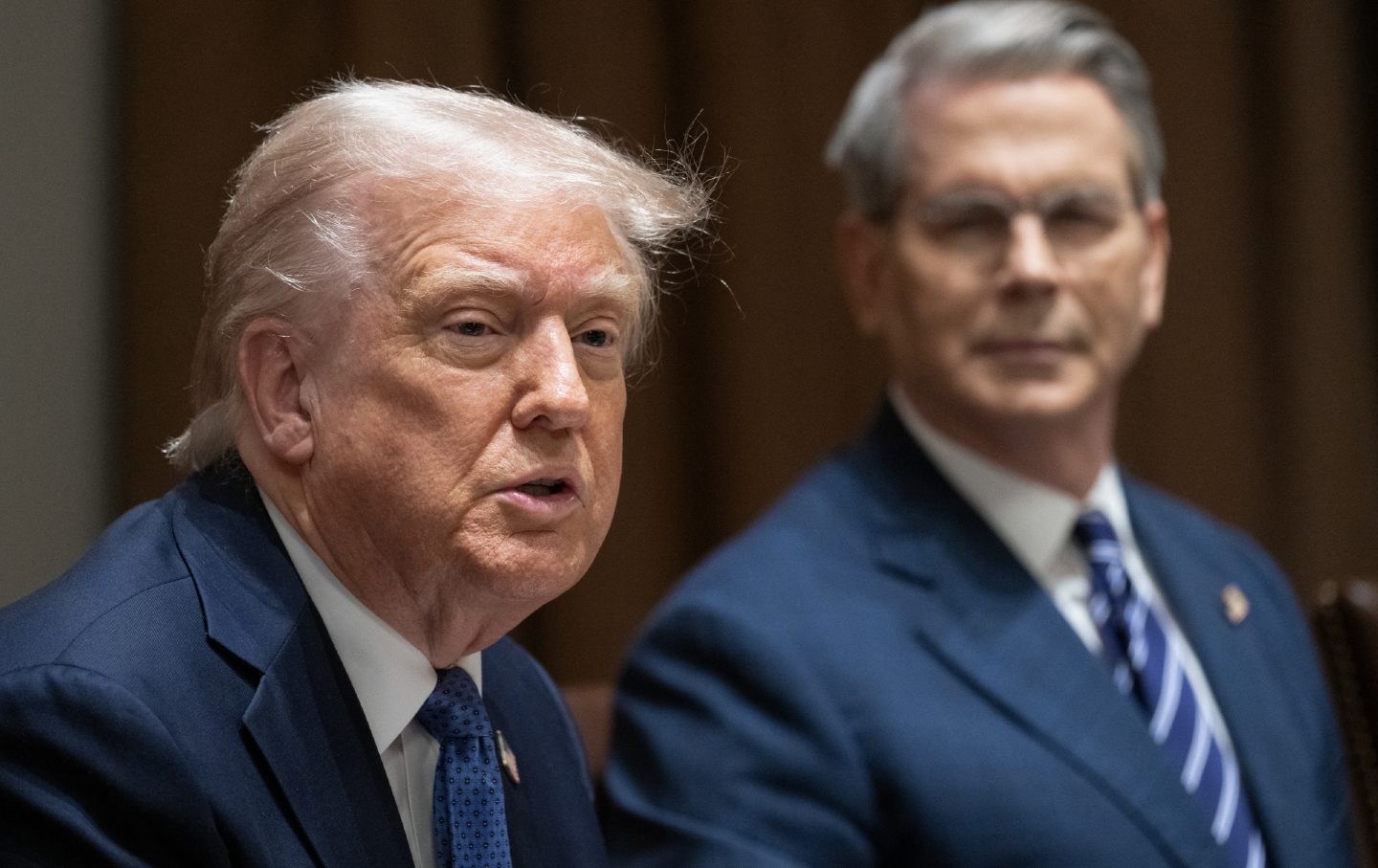August 19, 2025
Our grandparents would urge us all to defend and strengthen Social Security.

Last week, President Trump signed a proclamation celebrating Social Security’s 90th birthday, suggesting that his “one big beautiful bill” would “strengthen Social Security for generations to come.”
Unfortunately, Trump’s mega bill does exactly the opposite. It does absolutely nothing to address Social Security’s looming insolvency in 2035, and instead would suck $1.6 trillion out of its trust fund over the next decade, hastening its insolvency by two years, according to the nonpartisan Tax Foundation.
What should really be concerning to “generations to come” is the shocking statement by Trump’s treasury secretary, Scott Bessent, that the child savings accounts included in the mega bill are a “back door for privatizing Social Security.”
Social Security has long been described as the “third rail of American politics”—touch it and die. Presidential candidate Mike Pence in 2023 proposed privatizing it, and his presidential campaign promptly died. President George W. Bush made privatization his highest priority in 2005, but not even Republicans would bring it up for a vote. Good thing, too. If it had succeeded, American retirees would have lost more than half their retirement savings in the Great Recession. Voters handed Democrats control of both Houses of Congress the next year.
President Eisenhower warned that there may be “a tiny splinter group” of politicians who want to mess with Social Security, but “their number is negligible and they are stupid.”
Though Bessent quickly realized his gaffe and the White House tried to backtrack, the cat was out of the bag.
Current Issue

As descendants of President Franklin D. Roosevelt and the cabinet that created our country’s most popular, effective government program, let us be perfectly clear: Turning Social Security over to private investment firms and the tender mercies of Wall Street would be a breach of American workers’ most precious guarantee of income security.
Social Security’s untouchable longevity is attributable to its structure—not a government giveaway, but an earned insurance benefit. Workers pay into it from every single paycheck in their life. Some 75 million Americans rely on it for old-age security, disability insurance, and survivors’ benefits. Privatization would be a stupid way to celebrate its birthday.
Nine in ten Americans want Social Security to remain a priority for the nation no matter the state of budget deficits, according to a 2024 study for the National Institute on Retirement Security. And it’s nonpartisan: support comes from 90 percent of Democrats, 86 percent of Republicans, and 88 percent of Independents.
Though Trump insists that he wouldn’t harm a hair on Social Security’s head, his own history belies his ongoing blithe assurances. His hugest unachieved social policy goal at the end of his first term was the complete termination of Social Security’s principal funding source, the payroll tax. And he told the World Economic Forum when running for reelection in 2020 that a second Trump term would mean cuts to Social Security, Medicare and Medicaid—the latter already successfully decimated in his mega bill giving trillions of dollars of tax cuts to the rich.
Indeed, the privatization of Social Security would be tragically consistent with the tax-cut law. It would be a gold mine for wealthy money managers and Wall Street tycoons, at the expense of ordinary working folk at risk of losing their retirement security in the stock market. Trump’s regressive tariffs similarly hit working families proportionately far harder than the wealthy.
Americans overwhelmingly want to preserve Social Security, across party lines, according to a 2025 study by the National Academy for Social Insurance. To address revenue shortfalls over the next decade, vast majorities prefer increasing revenues to reducing benefits. Their favorite revenue-raising option is eliminating the payroll tax cap, which exempts earnings above $176,100 from the tax. It obviously benefits the wealthiest while leaving ordinary workers to bear the lion’s share of the burden. The typical American CEO (median pay: $16.8 million) stops paying into Social Security after the fourth day of the new year (Elon Musk stops after four minutes)—an outrageous injustice to the 160 million Americans who pay 6.2 percent of every paycheck into Social Security throughout the entire year.
Popular
“swipe left below to view more authors”Swipe →
Workers’ second favorite revenue raiser to secure Social Security’s finances is, impressively, to increase the payroll tax that everybody pays—workers, employers, wealthy or not—from 6.2 to 7.2 percent. As the NASI study found, the preference for raising revenues rather than terminating, privatizing, or cutting Social Security crosses all lines of age, income, education, and political party—including even three in four Republicans.
The economic security of all Americans who rely on Social Security compels us to channel our illustrious ancestors who created it. Social Security is a solemn, trusted promise to workers, children, seniors, people with disabilities, and survivors. FDR said it best: “the security of the home, the security of livelihood, and the security of social insurance—are, it seems to me, a minimum of the promise that we can offer to the American people.”
Let’s take Treasury Secretary Bessent seriously. As they say in Washington, a “gaffe” is when a politician accidentally speaks the truth. No walk-backs. No putting the toothpaste back in the tube. Our grandparents would be urging us all to stand up to defend and strengthen Social Security.
In this moment of crisis, we need a unified, progressive opposition to Donald Trump.
We’re starting to see one take shape in the streets and at ballot boxes across the country: from New York City mayoral candidate Zohran Mamdani’s campaign focused on affordability, to communities protecting their neighbors from ICE, to the senators opposing arms shipments to Israel.
The Democratic Party has an urgent choice to make: Will it embrace a politics that is principled and popular, or will it continue to insist on losing elections with the out-of-touch elites and consultants that got us here?
At The Nation, we know which side we’re on. Every day, we make the case for a more democratic and equal world by championing progressive leaders, lifting up movements fighting for justice, and exposing the oligarchs and corporations profiting at the expense of us all. Our independent journalism informs and empowers progressives across the country and helps bring this politics to new readers ready to join the fight.
We need your help to continue this work. Will you donate to support The Nation’s independent journalism? Every contribution goes to our award-winning reporting, analysis, and commentary.
Thank you for helping us take on Trump and build the just society we know is possible.
Sincerely,
Bhaskar Sunkara
President, The Nation
More from The Nation

Party leaders are talking tough about retaliatory gerrymandering—but like Principal Rooney, they’re unable to fight back effectively
David Daley and David Faris

Trump has launched an all-out assault on civic freedoms, but the Democrats aren’t yet giving their base something to vote for.
Chris Lehmann

Across the country, rural hospitals will close, and the empty towns will mirror the quiet halls where doctors and nurses once rushed to heal.
Steve Bullock


